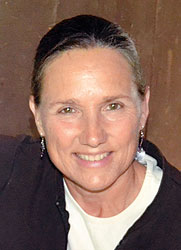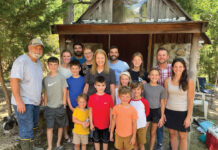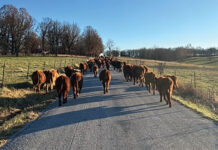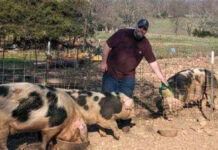
“I’ve been a teacher ever since I can remember,” is the way Ozarks farmer and disabled veteran Wendy Lombardi defined herself recently, sitting on the front porch of her home that sits on 40 acres in the far southeastern corner of rural Laclede County, Mo.
A single mother to P.K., a student at Missouri Western University in St. Joseph, Mo.; Natalie, who attends Missouri State University in West Plains, Mo.; and Nicholas, who just graduated from Plato High School and will also be at MSU at West Plains, Mo., in the fall, Wendy originally moved to the Ozarks to feed her children better and teach them about raising their own food.
Today, in addition to milking dairy goats, raising chickens and tending a few horses, Wendy is teaching basic farming skills to folks from all over the country and even the world. As a WWOOF (World Wide Opportunities on Organic Farms) host since 2010, Wendy and her farm have welcomed close to 30 volunteers from France, England, Germany, Wales, as well as various parts of the United States, as they come to learn the realities of farm life in America. Most recently, Katie Hill, a data analyst from Washington D.C., in her mid-20s, spent a week with Wendy learning the nitty-gritty of everything from the demands of daily milking, cleaning the hind ends of dairy goats and chickens, to just the fact that on the farm, there is always more work to do.
“I’ve learned so much this week about the hard work of taking care of animals,” Katie said. “I got to see a baby goat being born, rode a horse other than just on a trail ride, and tried to learn how to milk a goat,” she added. “Just the daily chores can involve dirty jobs, like examining the poop samples of the goats to control the parasites. Still, if you work hard, you can create a harmonious system where as you milk the goats, you share a little of that with the cats, who eat the mice. The horses eat the grass so you have to care for that, too but then you utilize the manure from all of them to fertilize the garden and grow better vegetables and fruits.
“I’ve traveled abroad, but I realized I didn’t know much about my own country beyond the [East] coast. I welcomed the opportunity to come west and learn more about this life.”
WWOOF offers that opportunity to people from all over the world. Wendy moved to the Ozarks in 2009 to finish raising her three children.
“I started in fitness classes 25 years ago and I knew the value of organic foods,” Wendy said. “While buying organic foods is more expensive, experts estimate you can save up to $20,000 a year for a family of six by raising your own food. We’ve been raising 90 percent of our own for the last several years between the farm and the garden.
Wendy said the main reason why small farms fail is a lack of understanding of how much work is involved. She herself is facing a lack of manpower, which is why WWOOF has been an asset to her.
“For years, my kids helped but now two are grown and gone, and the youngest has just graduated from high school. They are all off to college or soon will be,” Wendy said. “The volunteers have been a great help and at the same time, I’m helping them to understand so many facets of life and work on the small farm. They may come here, not knowing a lot of the specifics of how to do things, but they can mulch the garden, while I’m running a brush hog.
“In other countries, cooperative grassroots programs have helped small farmers and they once did here. We still see that spirit in our Mennonite communities, for instance, as they come together for big projects, like a barn raising. For small farms in this country and so many others, it is about raising the food and that is something that has always been essentially the woman’s role. Food is important to our families. Feed your family first, then your neighbors and then your community. If the small farm is going to survive, that is something we need to get back to, helping one another.”
Katy admitted that while she is returning to a life far from the farm back in a big city, she still hopes to incorporate some of what she has learned into her daily life. “I’ve learned different ways that human beings can work with the earth, not against it. I’ll be going out of my way to learn more about agriculture in my home area and better ways to use my money to buy good food.”
“Sharing this kind of agriculture education and information with young people is so important. We don’t know where it will take them, how it will influence their world but it is certain to make a difference somewhere down the road,” Wendy added.
Wendy has accepted a position at a university in Iowa, where she will continue to share agriculture education with the next generation, but in a less physically demanding capacity.
She is looking for a buyer for her farm as she moves closer to her aging parents and a new adventure in Midwestern agriculture.







